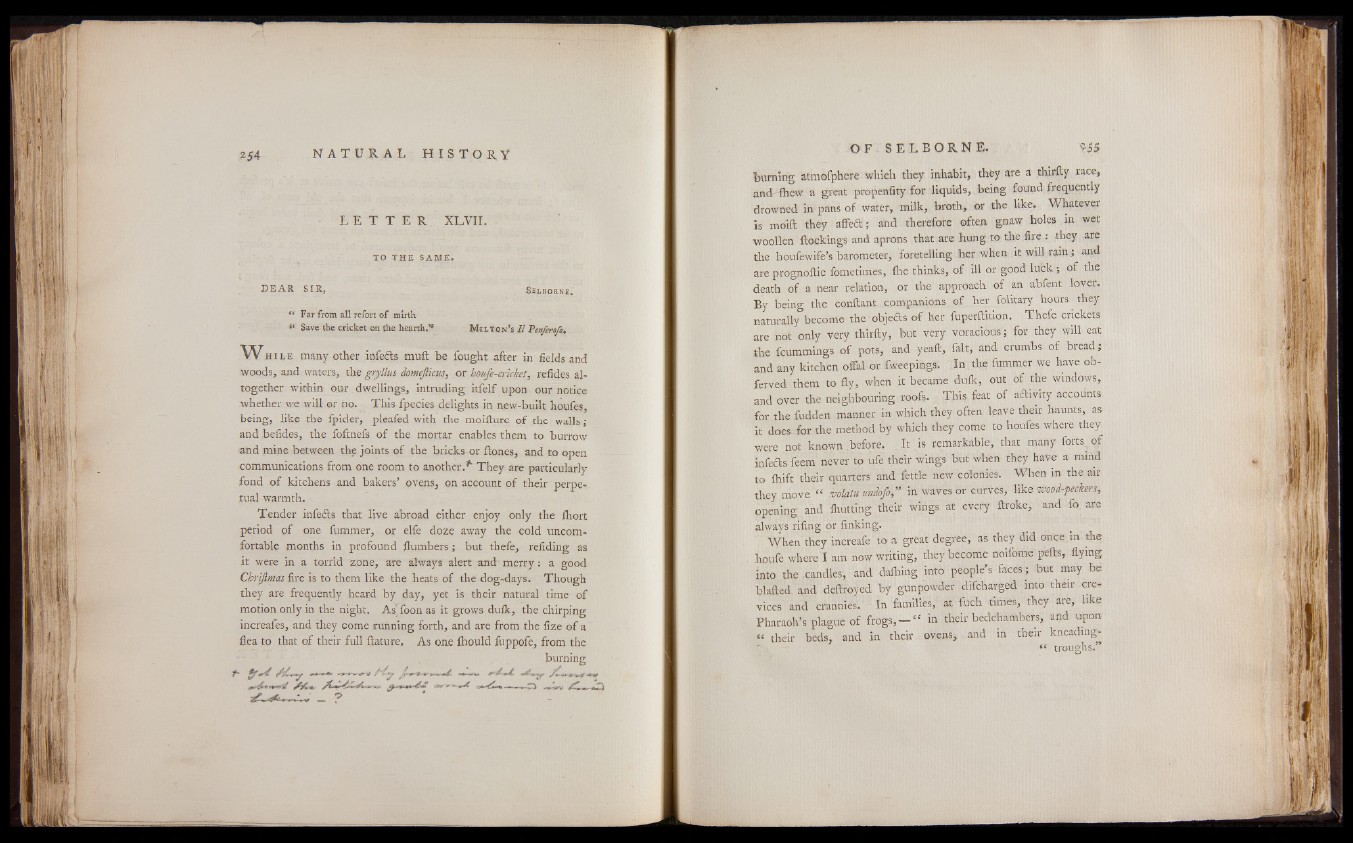
L E T T E R XLVII.
TO THE SAME.
D E A R S IR , Selborne.
<e Far from all refort o f mirth
s< Save the cricket on the hearth,*® Mil t o n ’s 11 Ven/erafo*
W h ile many other infedts mull be fought after in fields and
woods, and waters, the gryllus domejlkus, or houfe-cricket, refides altogether
within our dwellings, intruding itfelf upon our notice
whether we will or no. This fpecies delights in new-built houfes,
being, like the fpider, pleafed with the moifture of the walls;
and befides, the foftnefs of the mortar enables them to burrow
and mine between the joints of the bricks or flones, and to open
communications from one room to another.* They are particularly
fond of kitchens and bakers’ ovens, on account of their perpetual
warmth.
Tender infedts that live abroad either enjoy only the Ihort
period of one fummer, or elfe doze away the cold uncomfortable
months in profound flumbers; but thefe, refiding as
it were in a torrid zone, are always alert and merry; a good
Chrijimas fire is to them like the heats of the dog-days. Though
they are frequendy heard by day, yet is their natural time of
motion only in the night. As' foon as it grows dufk, the chirping
increafes, and they come running forth, and are from the fize of a
flea to that of their full ftature. As one fhould fuppofe, from the
burning
)*- ^if .y .»— ^ /a-.'.
■ 0*&*t*f it --' r ' O. . -Cn . ■ —
z'Uafc— _ ?
burning atmofphere which they inhabit, they are a thirfly race,
and fhe-w a great propenfity for liquids, being found frequently
drowned in pans of- water, milk, broth, or the like. Whatever
is moift they affedt; and therefore often gnaw holes in wet
woollen dockings and aprons that are hung to the fire : they are
the houfewife’s barometer, foretelling her when it will rain ; and
are prognoftic fometimes, fhe thinks, of ill or good luck ; of the
death of a near relation, or the approach of an abfent lover.
By being the conftant companions of her folitary hours i they
naturally become the obje&s of her fuperftition. Thefe crickets
are not only very thirfty, but very voracious; for they will eat
the fcummings of pots, and yeaft, fait, and crumbs of bread;
and any kitchen offal or fweepings. In the fummer we have ob-
ferved them to fly, when it became dulk, out of the windows,
and over the neighbouring roofs. This feat of adtivity accounts
for the fudden manner in which they often leave their haunts, as
it does for the method by which they come to houfes where they
were not known before. It is remarkable, that many fortso f
infedts feem never to ufe their wings but when they have a mind
to fhift their quarters and fettle new colonies. When in the air
they move “ mlatu undofo, ’’ in waves or curves, like wood-peckers,
opening and Quitting their wings at every ftroke, and fo. are
always riling or finking. .
When they increafe to a great degree, as they did mice m the
lioufe where I am now writing, they become noifome pefts, flying
into the candles, and dafhing into people’s faces; but may be
blafted and deftroyed by gunpowder difcharged into their crevices
and crannies. In families," at fuch times, they are, like
Pharaoh’s plague of frogs, — “ in their bedchambers, and upon
“ their beds, and in their ovens, and in their kneading-
“ troughs.”